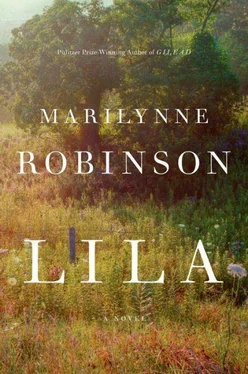The preacher said, “This better wait till morning. I’d like Lila to have a chance to think this over.”
Doll said, “Mister, you ain’t nothing to her, and you ain’t nothing to me. Lila, you want to stay here?”
So the girl stood up and let herself be hugged, and let herself be guided down the walk. The preacher said, “She can keep the blanket.”
And Doll said, “ I take care of her. She has what she needs.”
Lila would not cry. She could see Doll’s grief and pity and regret, and she took a bitter, lonely pride in the fact that she could see them and not forgive her and not cry.
She was sitting there remembering those times, and then she thought she heard someone out in the road. Footsteps. The scatter of gravel. She had a knife, but it wasn’t much use in the dark, because folks couldn’t see it. It was good only for scaring them off. If you cut somebody you were in a world of trouble no matter what the story was. Still, she eased toward it, where it was stuck in the floor behind her bedroll. She didn’t hear anything more for a minute or two, and then she heard steps again, whoever it was walking away. She thought, He found out what he wanted to know. I’m here, and I have a fire and supper. That greasy old hen must have smelled like a kind of prosperity. The thought pleased her. Now he’ll think I don’t need nothing from him. If it was him.
Doane must have decided that if the world was turning mean he might as well go along with it. He wasn’t a big fellow. He looked a lot like Hoagy Carmichael, though they didn’t know it at the time. But he always could look mean when he wanted, and Arthur would stand right behind him, at his shoulder, looking pretty mean, too, so someone might think if anything started he’d be right there to back him up. Before the times got hard they generally knew who they were dealing with, so they’d act that way only if a stranger came along and they didn’t like the look of him, if he showed up after dark, or if he just rubbed Doane the wrong way for no reason anybody needed to know. Doane always kept them safe and they trusted him. They knew he had a knife. Everybody else had one, too, but the way they thought of his knife made them think he probably had a gun. He could be as dangerous as he might ever need to be, they were sure of it. They never saw a gun, and he used his knife to whittle and to cut his meat just like they did. Still. Sometimes Arthur’s boys would start scuffling, then they’d get serious about it and they’d start scrapping, trying to do some harm. If Arthur stepped into it they’d just go after Arthur. But Doane would say, “That’s enough,” and they’d stop. Arthur might cuff them a little because he was their father and he had to teach them respect, but the fight was over when Doane said, “Enough.” He’d say, “Someday you’re going to hurt yourselves so bad you won’t be good for nothing, and then we’ll just leave you lying alongside the road.”
Lila worked as hard as any of the children. She didn’t make them laugh the way Mellie did, but she never complained, she never took more than her share. She knew better than to mention school. But when hard times came they left her behind. There were people Doane just didn’t take to.
And now here she was, sitting in the dark, wishing the crickets weren’t so damn loud, thinking she might tell that old preacher not to come creeping around her place at night. That would put an end to it, all of it. Then she’d know for sure what he thought of her. She’d say it in church, where all them ladies would hear. Better wait till she could get a bus ticket. There’d be no more work for her after she did something like that. But when folks are down to the one thing that keeps them alive, that one thing can be meanness. It makes you feel like you’re there, you’re doing something. He is such a beautiful old man. All that kindness would be gone out of his face, and she would see something else, not beautiful, not the face he had worn all the years when he had only good people to deal with. That wife never meant to leave and take the child with her. So he didn’t really know much about being left. Lila thought, Maybe I can teach him a new kind of sadness. Maybe he really does care whether I stay or go.
The next morning she didn’t dare go to church. The way she’d been thinking, she might say anything. But she began to worry about the little garden she had planted and how the beans would be getting yellow and tough and stringy if she didn’t pick them. Sunday morning was the best time to sneak into that garden, because the preacher would be preaching and everybody else would be at one church or another or sleeping in. It was hard to tell just what time it was because the sky was dark with clouds. That meant it might rain, and she’d get caught in it and have to come back when she was halfway there, or get all the way to Gilead and then have to be there looking soaked and pitiful. She grabbed the carpetbag from the nail it was hanging on and smoothed her hair and took off toward town almost running, just to beat the weather, just to make up for a late start. At the preacher’s house she let herself in through the gate and went around the side of the house to the corner against the fence, and when she just began picking beans she heard raindrops hitting the leaves. She was going to take the few she had and get home the best she could, but when she reached the gate she looked down the street and saw the preacher coming. She thought, A crazy woman would do something like this. She had known some crazy women, and any one of them would probably have had better sense. There was more shame in life than she could bear.
He took off his hat. He said, “Well, good morning! Or is it afternoon?”
She held out the bag to him. “I thought you might be wanting some beans.” Oh, she wished she could die. How many were there in that bag? Eight? Ten?
He said, “That’s very kind of you,” and he took the bag out of her hand. She couldn’t look at him, but she knew he was smiling.
She said, “I got to go now.”
“Wait. You’ll want your bag.” He reached into it and took out the beans, half a handful, and gave the bag back to her. She still could not look at him. He said, “You know, it might be best if you waited out the rain. We could sit here on the porch a little while. It doesn’t look like much of a storm. Or I could lend you my umbrella if you really do have to go.” Then he said, “I haven’t seen much of you lately. I hope I haven’t offended you somehow.”
His voice was low and kind. After a minute she took a step toward him. Sometimes it just feels good to hug a man, don’t much matter which one it is. She’d thought it might be very nice to rest her head on his shoulder. And it was. She’d be leaving that damn town anyway.
“Well,” he said. He patted her back.
She said, “I guess I’m tired.”
“Yes, well—” and he put his arms around her, very carefully, very gently.
With her head still resting on his shoulder she said, “I just can’t trust you at all.” He laughed, a soft sound at her ear, a breath. She started to pull away, but he put his hand on her hair so she rested her head again.
He said, “Is there anything I can do about that?”
And she said, “Nothing I can think of. I don’t trust nobody.”
He said, “No wonder you’re tired.”
She thought, That’s a fact. She said, “You should know I pretty well give up on getting baptized.”
“I thought maybe you had. Can you tell me why?”
“I guess it don’t make a lot of sense to me.”
“That’s all right. No hurry about it. Unless you’re planning on leaving town.”
“That’s what I’m planning to do.”
He was quiet for a while. Then he said, “I’m sorry to hear that. I am.”
Читать дальше












